
|
You entered: gully
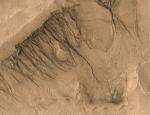 Unusual Gullies and Channels on Mars
Unusual Gullies and Channels on Mars
5.02.2003
What could have formed these unusual channels? Inside Newton Basin on Mars, numerous narrow channels run from the top down to the floor. The above picture covers a region spanning about 1500 meters across.
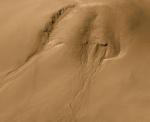 The Gullies Of Mars
The Gullies Of Mars
23.06.2000
The recently revealed gullies on Mars are rare. But they may prove to be sites of present day, near surface, liquid water, holding out the tantalizing possibility of martian life. Too small to have...
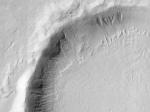 Melting Snow and the Gullies of Mars
Melting Snow and the Gullies of Mars
21.02.2003
Tantalizing images of gullies on Mars have offered striking evidence for recent flows of liquid water. But Mars is too cold and its atmosphere too thin for liquid water to exist on the surface.
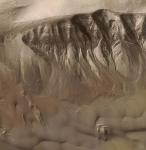 Gullies on Mars
Gullies on Mars
24.10.2002
The Gullies of Mars would probably not have been sensational enough for the title of a vintage Edgar Rice Burroughs story about the Red Planet. But it would get the attention of planetary scientists today.
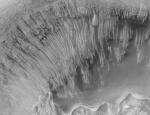 Newton Crater: Evidence for Recent Water on Mars
Newton Crater: Evidence for Recent Water on Mars
26.06.2000
What could have formed these unusual channels? Inside a small crater that lies inside large Newton Crater on Mars, numerous narrow channels run from the top down to the crater floor. The above picture covers a region spanning about 3000 meters across.
 Dry Ice Sled Streaks on Mars
Dry Ice Sled Streaks on Mars
17.06.2013
What creates these long and nearly straight grooves on Mars? Dubbed linear gullies, they appear on the sides of some sandy slopes during Martian spring, have nearly constant width, extend for as long as two kilometers, and have raised banks along their sides.
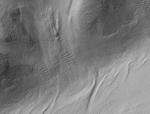 Young Martian Terrain
Young Martian Terrain
1.08.2001
What caused the pits, ridges, and gullies on otherwise smooth Martian terrain? One hypothesis is water. The lack of craters at this mid-latitude location indicates that the terrain is quite young by geological standards, perhaps only 100,000 years old.
 Stereo Helene
Stereo Helene
1.06.2024
Get out your red/blue glasses and float next to Helene, small, icy moon of Saturn. Appropriately named, Helene is a Trojan moon, so called because it orbits at a Lagrange point. A Lagrange point is a gravitationally stable position near two massive bodies, in this case Saturn and larger moon Dione.
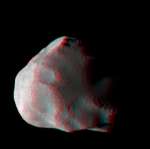 Stereo Helene
Stereo Helene
29.03.2025
Get out your red/blue glasses and float next to Helene, small, icy moon of Saturn. Appropriately named, Helene is a Trojan moon, so called because it orbits at a Lagrange point. A Lagrange point is a gravitationally stable position near two massive bodies, in this case Saturn and larger moon Dione.
 Stereo Helene
Stereo Helene
15.06.2019
Get out your red/blue glasses and float next to Helene, small, icy moon of Saturn. Appropriately named, Helene is one of four known Trojan moons, so called because it orbits at a Lagrange point. A Lagrange point is a gravitationally stable position near two massive bodies, in this case Saturn and larger moon Dione.
|
January February |
|||||||||||||||||||||||||||||||||||||||||||||||||